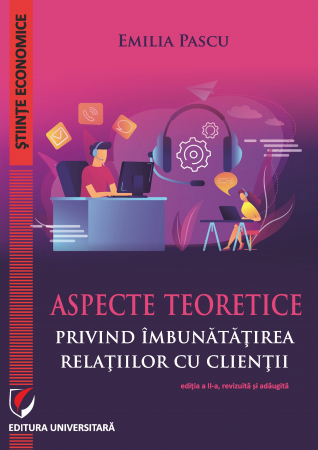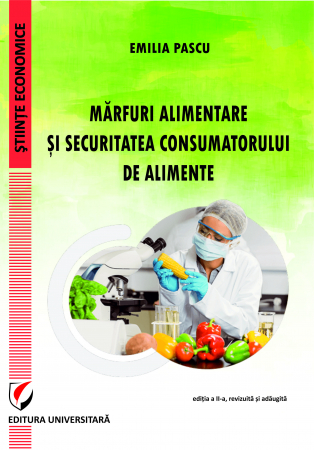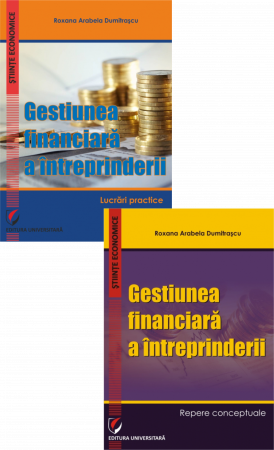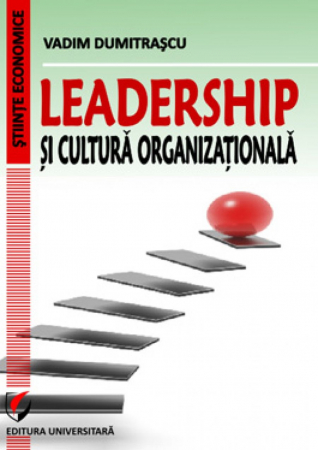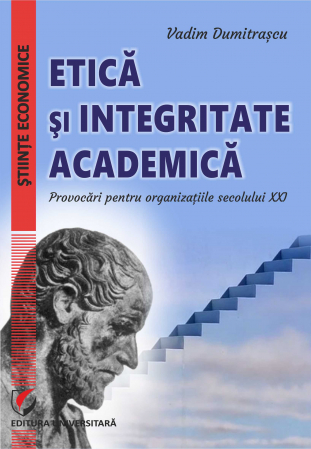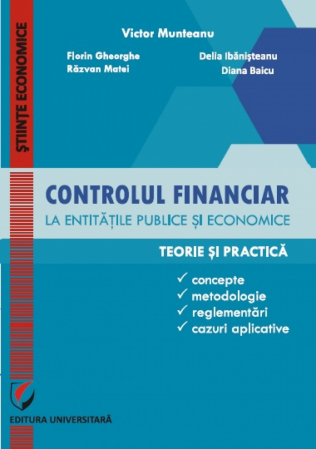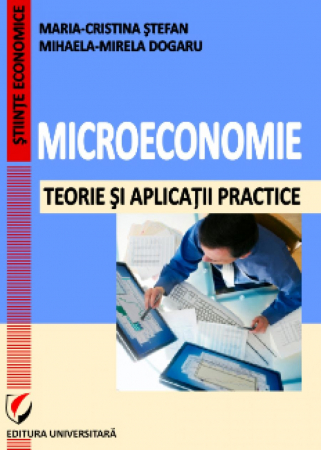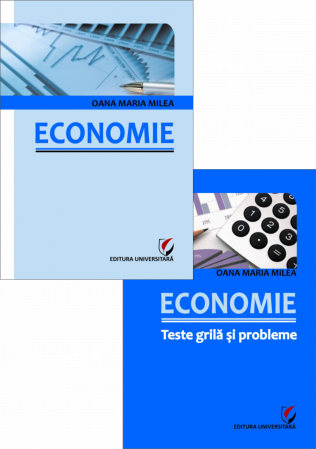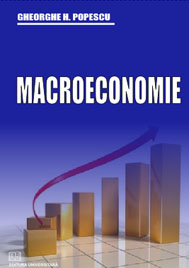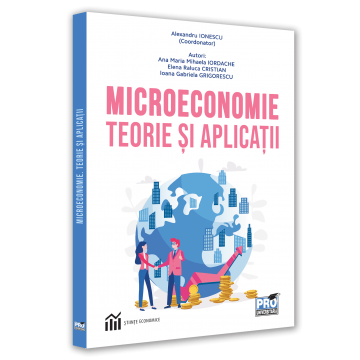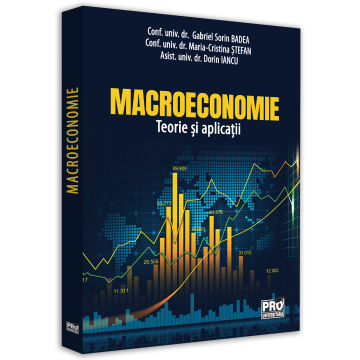Manuscript proposals: info@editurauniversitara.ro / 0745 204 115 //// Tracking orders Individuals / Sales:0745 200 718 / 0745 200 357 Orders Legal entities: 0721 722 783
Publisher: Editura Universitara
Author: Ion Lucian Catrina
ISBN: 978-606-591-549-7
DOI: 10.5682/9786065915497
Publisher year: 2012
Edition: I
Pages: 216
Product Code:
9786065915497
Do you need help?
0745 200 718
/
0745 200 357
- Description
- Download (1)
- Authors
- Content
- More details
- Where to find it
- Reviews (0)
As the title suggests, the Romanian economy was certainly the central pivot of my scientific interest. The management of the restructurings in the Romanian economy in the two decades of transition, the adaptation of the Romanian business environment to the harsh European competitive conditions, the redefinition of the state's involvement in the national economy were the aspects I think we found the appropriate answers to. Beyond these, I set out to follow in a critical note the degree to which Romania has managed to integrate into the European economy, to capitalize on the advantages of a huge market and especially to take advantage of non-reimbursable logistical and financial support from the European Commission. . I could not help but look in a critical tone at the underutilization of some major competitive advantages that Romania has: underutilization and inefficient use of agricultural resources, subsoil resources, underutilization of energy resources or the constant loss of highly qualified human resources.
I want this material to prove useful and interesting not only to students eager for knowledge and improvement in the vast field of macroeconomic policies, but also to those who, affected or not by the effects of the economic crisis, have asked questions or still have dilemmas. who have not yet found the satisfactory answer.
The Author
I want this material to prove useful and interesting not only to students eager for knowledge and improvement in the vast field of macroeconomic policies, but also to those who, affected or not by the effects of the economic crisis, have asked questions or still have dilemmas. who have not yet found the satisfactory answer.
The Author
-
Economia României. Politici economice în contextul integrării interstatale
Download
ION LUCIAN CATRINA
FOREWORD / 7
1. STATE INTERVENTIONISM IN THE ECONOMY / 10
1.1. Theoretical bases of interventionism / 10
1.2. Market failure and public intervention / 13
1.3. Economic policies and intervention mechanisms / 20
2. EUROPEAN INTEGRATION MODEL / 36
2.1. Coordinates of integrated economic development / 36
2.2. European economic integration / 47
2.3. Management of reforms and economic restructuring in Romania / 73
3. INTEGRATED ECONOMIC POLICIES AND INNOVATIVE INVESTMENTS / 95
3.1. Economic investments and their specificity in integration conditions / 95
3.2. Investments in innovative technologies / 103
3.3. Flows of the evolution of the economy towards a new formula of existence / 108
4. EUROPEAN ECONOMIC CONVERGENT / 119
4.1. Nominal convergence requirements / 121
4.2. Difficulties in achieving real convergence / 130
4.3. Consolidation of public finances, a long process / 134
5. FISCAL-BUDGETARY POLICIES AT EUROPEAN UNION LEVEL / 146
5.1. Introduction to the paradigm of balanced budgets / 146
5.2. Emergence of the Fiscal Compact / 150
5.3. The Fiscal Pact and the public debt of Romania / 157
6. INTRODUCTION TO SOVEREIGN RISK ANALYSIS / 163
6.1. Country risk / 163
6.2. Factors that favor the occurrence of sovereign risk / 165
6.3. Non - economic determinants of sovereign risk / 167
7. COMPETITION AND COMPETITIVENESS AT EUROPEAN UNION LEVEL / 176
7.1. Deregulation and competition / 176
7.2. The decline of European competitiveness / 180
7.3. Competition and competitiveness in the world economy / 188
7.4. From the objective of economic growth to that of sustainable development / 199
BIBLIOGRAPHY / 210
1. STATE INTERVENTIONISM IN THE ECONOMY / 10
1.1. Theoretical bases of interventionism / 10
1.2. Market failure and public intervention / 13
1.3. Economic policies and intervention mechanisms / 20
2. EUROPEAN INTEGRATION MODEL / 36
2.1. Coordinates of integrated economic development / 36
2.2. European economic integration / 47
2.3. Management of reforms and economic restructuring in Romania / 73
3. INTEGRATED ECONOMIC POLICIES AND INNOVATIVE INVESTMENTS / 95
3.1. Economic investments and their specificity in integration conditions / 95
3.2. Investments in innovative technologies / 103
3.3. Flows of the evolution of the economy towards a new formula of existence / 108
4. EUROPEAN ECONOMIC CONVERGENT / 119
4.1. Nominal convergence requirements / 121
4.2. Difficulties in achieving real convergence / 130
4.3. Consolidation of public finances, a long process / 134
5. FISCAL-BUDGETARY POLICIES AT EUROPEAN UNION LEVEL / 146
5.1. Introduction to the paradigm of balanced budgets / 146
5.2. Emergence of the Fiscal Compact / 150
5.3. The Fiscal Pact and the public debt of Romania / 157
6. INTRODUCTION TO SOVEREIGN RISK ANALYSIS / 163
6.1. Country risk / 163
6.2. Factors that favor the occurrence of sovereign risk / 165
6.3. Non - economic determinants of sovereign risk / 167
7. COMPETITION AND COMPETITIVENESS AT EUROPEAN UNION LEVEL / 176
7.1. Deregulation and competition / 176
7.2. The decline of European competitiveness / 180
7.3. Competition and competitiveness in the world economy / 188
7.4. From the objective of economic growth to that of sustainable development / 199
BIBLIOGRAPHY / 210
In the elaboration of this paper, my scientific preoccupation was composed of two distinct but interdependent segments: on the one hand, a first element was the analysis of the European integration process, in the context of the last wave of enlargement and the challenges of the contemporary economic crisis; on the other hand, I wanted to critically evaluate the process of integration of the Romanian economy in the economy of the European Union, in order to highlight how Romania has benefited or not the advantages of European membership.
My effort was an analysis that would take into account the contemporary scientific trend, namely an interdisciplinary penetration of the studied macroeconomic phenomena. This was also determined by the fact that the isolation of an economic, political, social or religious event and its approach only from the perspective of a certain critical angle, proves sooner or later its practical and scientific limits. Thus, it is no coincidence that the book begins with a brief introspection on the role, functions and limits of state involvement in the economy. This was questioned by me both before Romania's accession to the European Union and after this moment and becomes even more important today, when European states are called to political flexibility and increased delegation of exclusive responsibilities, from national level to supranational level.
Furthermore, both the mechanisms of European integration and the critical economic policies are analyzed, in which the inaction of European leaders has already led to declining rates of economic growth and relative losses of well-being for European citizens. The objectives missed in the last decade can be summarized as: transforming the European economy into an economy based on innovation and knowledge, adapting it to the demands of the hi-tech era, adopting a non-inflationary growth model, closing economic and social development gaps, consolidating public finances , greater flexibility of the European labor market, sustainability of the banking sector and regaining competitiveness in foreign markets.
The fact that in the paper a more consistent weight is allocated to fiscal-budgetary policies, fears of sovereign risk and consolidation of public finances in the Union was determined by the fact that large structural budget deficits and continued deterioration of the public debt stock stood out as the main challenges of the European economic crisis. Moreover, with each passing day, more and more supporters of the federalist vision of the common fiscal policy coagulate, its main components being: a more consistent common budget than the current one, fueled by higher transfers and used for redistribution for real cohesion, a a unified taxation policy and an efficient, flexible common fiscal authority, able to quickly implement measures to stimulate and macrostabilize the European economy.
As the title suggests, the Romanian economy was certainly the central pivot of my scientific interest. The management of the restructurings in the Romanian economy in the two decades of transition, the adaptation of the Romanian business environment to the harsh European competitive conditions, the redefinition of the state's involvement in the national economy were the aspects I think we found the appropriate answers to. Beyond these, I set out to follow in a critical note the degree to which Romania has managed to integrate into the European economy, to capitalize on the advantages of a huge market and especially to take advantage of non-reimbursable logistical and financial support from the European Commission. . I could not help but look in a critical tone at the underutilization of some major competitive advantages that Romania has: underutilization and inefficient use of agricultural resources, subsoil resources, underutilization of energy resources or the constant loss of highly qualified human resources.
I want this material to prove useful and interesting not only to students eager for knowledge and improvement in the vast field of macroeconomic policies, but also to those who, affected or not by the effects of the economic crisis, have asked questions or still have dilemmas. who have not yet found the satisfactory answer.
Not only by virtue of a moral duty, but also as a sincere feeling towards the people I met and who fundamentally marked my path, I want to thank my teachers. They are the ones who played an essential role in my teaching and scientific career, and I want to thank them in chronological order or, in other words, in the order in which they left their mark on my future: prof. Univ. Dr. Emil Moroianu, univ. prof. dr. Georgeta Ghebrea, prof. univ. dr. Dumiru Ciucur, prof. univ. Dr. Donatela Bolech, prof. univ. Dr. Philippe Claret, Prof. Univ. dr. Mircea Cosea, prof. univ. Dr. Gabriela Victoria Anghelache, prof. univ. dr. Nicolae Dardac, univ. Dr. Alberto Majocchi.
Thanks also to my colleagues, prof. Univ. dr. Cecilia Tohaneanu, univ. prof. dr. Alexandru Florian, univ. prof. dr. Alexandru Radu and associate professor Dr. Gheorghe Ciascai, who gave me more confidence and hope than maybe I had in myself.
The Author
My effort was an analysis that would take into account the contemporary scientific trend, namely an interdisciplinary penetration of the studied macroeconomic phenomena. This was also determined by the fact that the isolation of an economic, political, social or religious event and its approach only from the perspective of a certain critical angle, proves sooner or later its practical and scientific limits. Thus, it is no coincidence that the book begins with a brief introspection on the role, functions and limits of state involvement in the economy. This was questioned by me both before Romania's accession to the European Union and after this moment and becomes even more important today, when European states are called to political flexibility and increased delegation of exclusive responsibilities, from national level to supranational level.
Furthermore, both the mechanisms of European integration and the critical economic policies are analyzed, in which the inaction of European leaders has already led to declining rates of economic growth and relative losses of well-being for European citizens. The objectives missed in the last decade can be summarized as: transforming the European economy into an economy based on innovation and knowledge, adapting it to the demands of the hi-tech era, adopting a non-inflationary growth model, closing economic and social development gaps, consolidating public finances , greater flexibility of the European labor market, sustainability of the banking sector and regaining competitiveness in foreign markets.
The fact that in the paper a more consistent weight is allocated to fiscal-budgetary policies, fears of sovereign risk and consolidation of public finances in the Union was determined by the fact that large structural budget deficits and continued deterioration of the public debt stock stood out as the main challenges of the European economic crisis. Moreover, with each passing day, more and more supporters of the federalist vision of the common fiscal policy coagulate, its main components being: a more consistent common budget than the current one, fueled by higher transfers and used for redistribution for real cohesion, a a unified taxation policy and an efficient, flexible common fiscal authority, able to quickly implement measures to stimulate and macrostabilize the European economy.
As the title suggests, the Romanian economy was certainly the central pivot of my scientific interest. The management of the restructurings in the Romanian economy in the two decades of transition, the adaptation of the Romanian business environment to the harsh European competitive conditions, the redefinition of the state's involvement in the national economy were the aspects I think we found the appropriate answers to. Beyond these, I set out to follow in a critical note the degree to which Romania has managed to integrate into the European economy, to capitalize on the advantages of a huge market and especially to take advantage of non-reimbursable logistical and financial support from the European Commission. . I could not help but look in a critical tone at the underutilization of some major competitive advantages that Romania has: underutilization and inefficient use of agricultural resources, subsoil resources, underutilization of energy resources or the constant loss of highly qualified human resources.
I want this material to prove useful and interesting not only to students eager for knowledge and improvement in the vast field of macroeconomic policies, but also to those who, affected or not by the effects of the economic crisis, have asked questions or still have dilemmas. who have not yet found the satisfactory answer.
Not only by virtue of a moral duty, but also as a sincere feeling towards the people I met and who fundamentally marked my path, I want to thank my teachers. They are the ones who played an essential role in my teaching and scientific career, and I want to thank them in chronological order or, in other words, in the order in which they left their mark on my future: prof. Univ. Dr. Emil Moroianu, univ. prof. dr. Georgeta Ghebrea, prof. univ. dr. Dumiru Ciucur, prof. univ. Dr. Donatela Bolech, prof. univ. Dr. Philippe Claret, Prof. Univ. dr. Mircea Cosea, prof. univ. Dr. Gabriela Victoria Anghelache, prof. univ. dr. Nicolae Dardac, univ. Dr. Alberto Majocchi.
Thanks also to my colleagues, prof. Univ. dr. Cecilia Tohaneanu, univ. prof. dr. Alexandru Florian, univ. prof. dr. Alexandru Radu and associate professor Dr. Gheorghe Ciascai, who gave me more confidence and hope than maybe I had in myself.
The Author
www.editurauniversitara.ro
If you want to express your opinion about this product you can add a review.
write a review
Customer Support Monday - Friday, between 8.00 - 16.00
0745 200 718 0745 200 357 comenzi@editurauniversitara.ro
6359.png)
![Romanian economy. Economic policies in the context of interstate integration [1] Romanian economy. Economic policies in the context of interstate integration [1]](https://gomagcdn.ro/domains/editurauniversitara.ro/files/product/large/economia-romniei-politici-economice-n-contextul-integrrii-interstatale-1593-402305.jpg)
